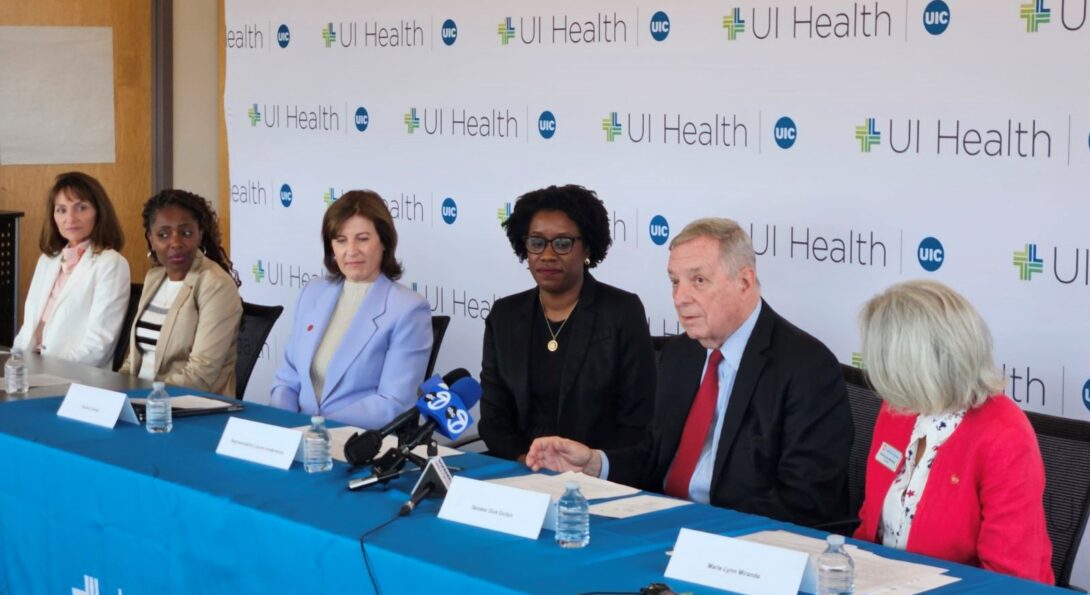New maternal health research center addresses national crisis in pregnancy outcomes

A new center at the University of Illinois Chicago dedicated to maternal health research will try to reduce health inequities in maternal morbidity and mortality with an $11 million, six-year grant from the National Institutes of Health.
The Maternal Health Research Center of Excellence will conduct new scientific studies, train and develop a diverse, interdisciplinary research workforce and partner with communities to promote maternal health equity.
“The establishment of the Maternal Health Research Center of Excellence by the National Institutes of Health is an important commitment to ensuring that every woman, regardless of background, has access to the highest standards of maternal care,” said UIC Chancellor Marie Lynn Miranda. “Together we have the expertise, the dedication and the shared vision to create a brighter, healthier future for mothers and their families.”
The center was announced at a July 17 roundtable attended by Miranda, U.S. Sen. Dick Durbin, U.S. Rep. Lauren Underwood and UIC researchers, clinicians and patients. Speakers emphasized the urgent need to address the ongoing maternal health crisis, under which overall mortality has nearly doubled and racial disparities have widened since the COVID-19 pandemic.
“Every year in the United States, we lose approximately 1,000 pregnant or postpartum women, and tens of thousands of others suffer very serious near-death conditions. Women of color are three times more likely than white women to die as a result of their pregnancy,” Durbin said. “This is unacceptable, especially considering that nearly 80 percent of these deaths are preventable with the right health care interventions.”
The center builds on decades of research, training and education, clinical care and community partnership around maternal health at UIC, including programs such as the Center of Excellence in Maternal and Child Health, the Building Interdisciplinary Research Careers in Women’s Health fellowship and the UI Health Two-Generation Clinic.
“This university is cutting edge in its research that will save moms’ lives, and this award is so well deserved,” Underwood said. “It is heartening to see facilities like this one here in our community so dedicated to providing good and equitable care for moms and families.”
Expanding the maternal health research community
To address the challenge of decreasing maternal morbidity and mortality, the new UIC center will unite experts from across 14 health and science disciplines in pillars for research, training and community engagement. The center is led by Dr. Rachel Caskey, the Earl M. Bane Professor and head of the department of medicine, and co-principal investigator Anne Elizabeth Glassgow, research assistant professor of medicine and pediatrics, both in the College of Medicine.
“The center will elevate the importance of maternal health as a topic of research across the country and will train future generations of maternal health researchers,” Caskey said. “We will embed the voices of women and people with lived experience to ensure all center activities are equity-focused, and we will elevate the voices of those most impacted by maternal morbidity and mortality.”
The center’s research will focus on social epigenetics — the mechanisms by which environment and exposures change genes and biology in a way that increases the risk for disease, poor health and mental health, and ultimately contribute to maternal health disparities.
“We know that structural inequity and social experiences, such as living in concentrated disadvantage, poverty and exposure to extreme violence, all create trauma and toxic stress that accumulate across the lifetime for new moms,” Glassgow said. “This research is key to understanding the links between neighborhood and social environment and adverse exposures that lead to biological changes and poor health.”
Data collected by the study will be used to develop new diagnostic tools and interventions to protect maternal health and will be shared within the national research network created by the NIH IMPROVE initiative. Sage Kim, professor of health policy and administration in the UIC School of Public Health, will lead the center’s data science efforts.
The collaboration will also create new programs to develop and train researchers from across different disciplines to study maternal health. These training core efforts will be led by Arden Handler, professor of community health sciences in the UIC School of Public Health.
“We know that there is a need to build a workforce that understands the issues, that is diverse and that comes from multidisciplinary backgrounds,” Handler said. “We can’t tackle this problem by just conducting clinical, health services or epidemiology research alone, we need to have people that think outside of the box and who can talk across disciplines.”
The center’s community core, led by Kenya McRae, research assistant professor of medicine, will partner with Everthrive Illinois and Alliance Chicago to create a community advisory board and disseminate findings and interventions across the city and state.
“We want to make sure the community’s voice, the voice of women and people who have lived through or are living through adverse experiences related to pregnancy, are part of this effort,” Caskey said.
Read more: https://go.uic.edu/maternalhealth